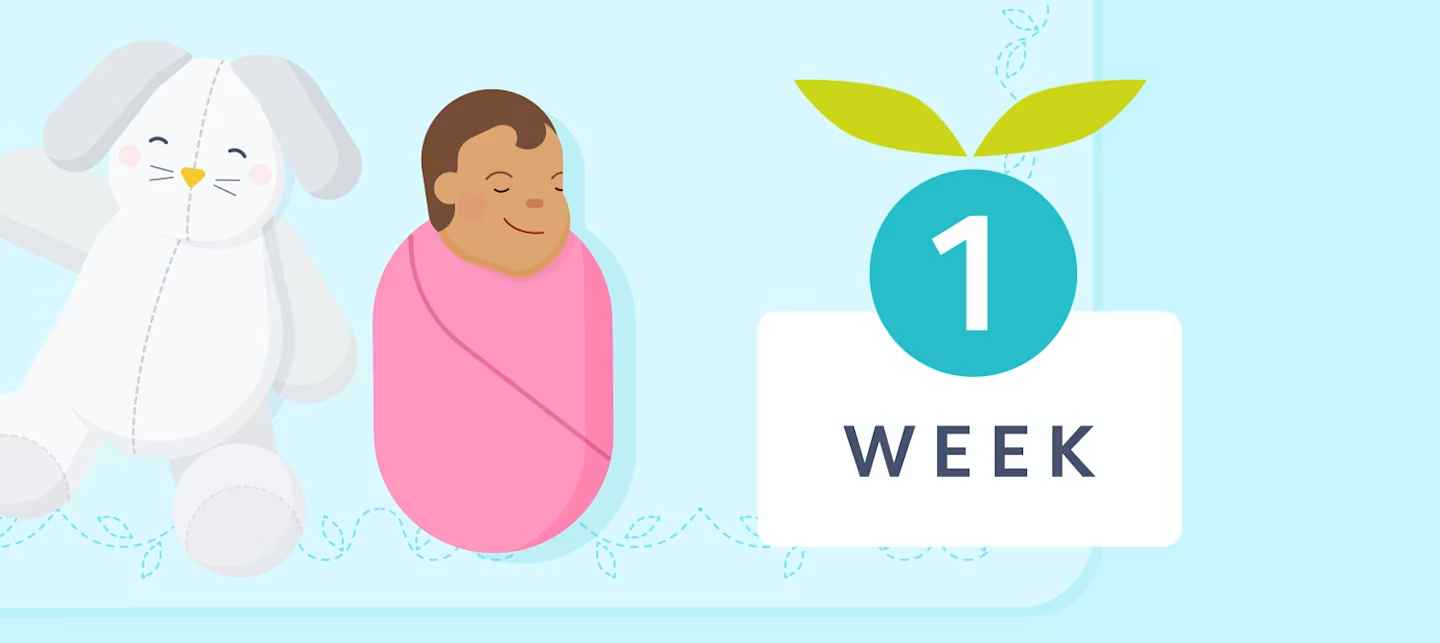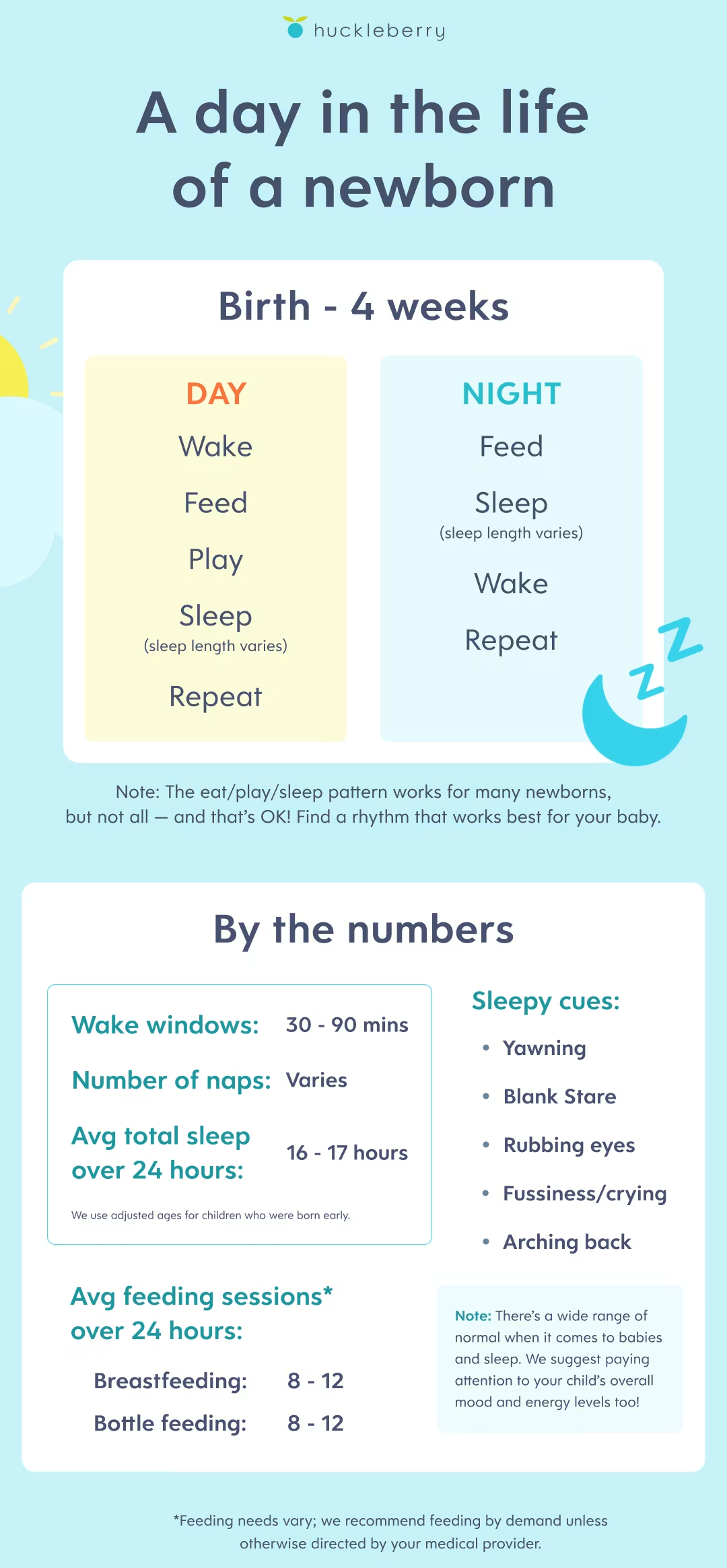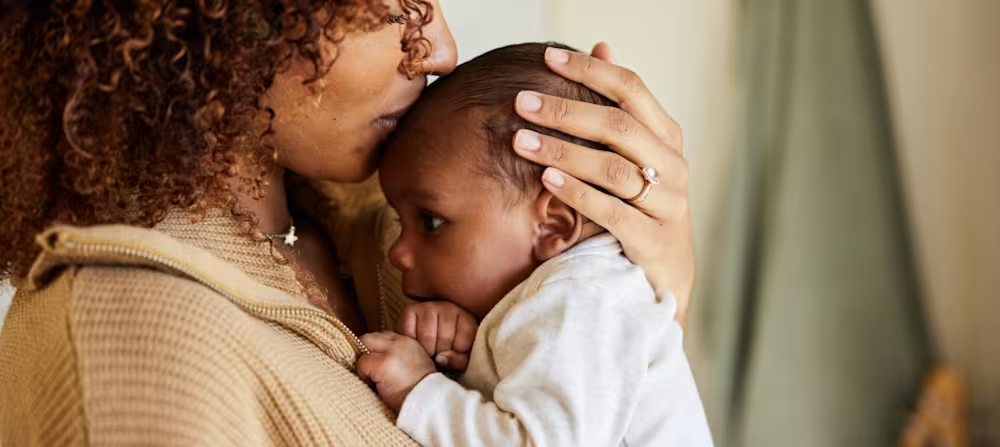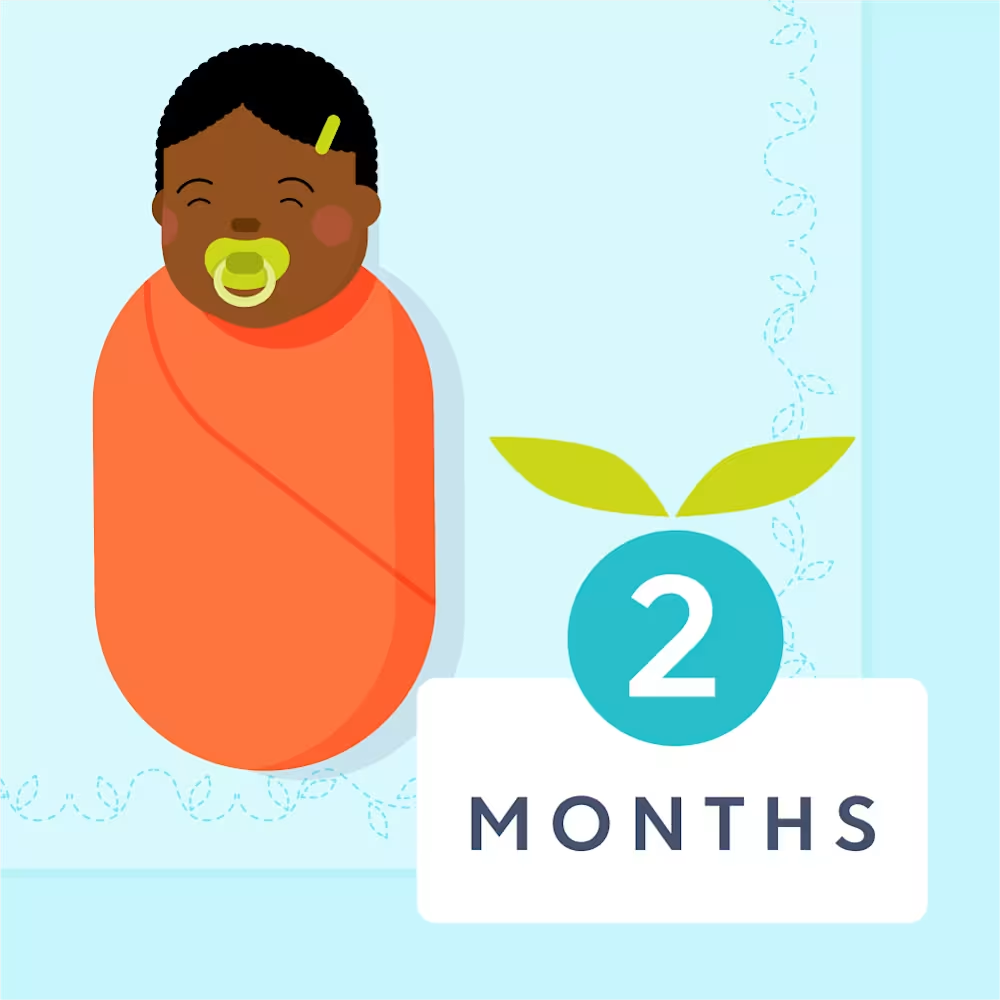1 week old sleep schedule: Bedtime and nap schedules
Updated Dec 15, 2025

Congratulations on your new baby! The first few weeks after birth are often a mix of emotions as you get to know your little one and they begin to adjust to life outside the womb. As you settle in at home, you may start to wonder if you’re doing things “right,” especially when it comes to your baby’s sleep. We’re here to reassure you that newborn babies sleep a lot and aren’t developmentally ready to follow any predictable sleep schedules or patterns yet.
In this article, we’ll give you some tools to help you determine when your baby may need to snooze again, offer insight into when you may expect more regular sleep patterns, and answer frequently asked questions about newborn sleep.
How much should a 1 week old sleep?
Chances are your 1 week old is pretty sleepy. This is expected as your child starts to adapt to life outside the womb. We hope to see around 15.5 hours of sleep at around 1 week old, but your little one may sleep more or less than this in those first weeks and months. The American Academy of Pediatrics (AAP) suggests that newborns sleep around 16 - 17 hours per day [].
At this age, we don’t expect to see predictable patterns when it comes to frequency or duration of sleep. Instead, babies at 1 week may sleep for 30 minutes for one nap then 2 hours the next nap and both would be considered normal. The newborn phase is full of unpredictability and though this can be frustrating, rest assured that it’s temporary. Around babies typically have more regular 24-hour rhythms of eating and sleeping.
However, we don’t recommend putting your baby on a “by the clock” sleep schedule until or older, when their circadian rhythm becomes more developed.
Here's a quick overview of what you may expect when it comes to 1 week olds and sleep. Note that these figures are averages and should be used as guidelines.
Sample schedule for 1 week olds
At 1 week, your little one's "schedule" will likely still be unpredictable. Sleep times and durations will vary and this is normal! Here's what a day in the life of a 1 week old newborn may look like:

Top sleep tips for 1 week olds
Keep in mind that it’s developmentally appropriate for newborn sleep to be all over the place, especially at 1 week old. Your little one is just starting to get used to the big, wide world. However, if you’re looking for ways to know if your baby is ready to sleep again, it may be helpful to keep an eye on the amount of time they’ve been awake (you’ll commonly see this referred to as a “wake window.”).
Newborns can usually comfortably stay awake for around 30 - 90 minutes before they’re ready to snooze again. It may feel like all you’re doing is feeding your baby and changing their diaper before it’s time to sleep again!
Note there’s a wide spectrum of what’s healthy and normal when it comes to baby sleep. In addition to keeping tabs on your little one’s daily sleep totals, we recommend paying attention to their mood and energy levels to gauge if they’re getting the rest they need to grow and develop.
Sleep fact for 1 week old babies
One of the main factors that drives sleep at 1 week is hunger. Newborns tend to wake frequently [] because their tummies are tiny and they often get hungry again quickly. We recommend following an (also called responsive feeding []), whether they’re bottle-fed or breastfed. The AAP recommends [] 10 - 12 feeding sessions per 24 hours for breastfed babies. For bottle-fed newborns, the recommendation is a minimum of 8 feedings per 24 hours. Keep in mind a baby’s tummy [] is about the size of a marble at birth and by 10 days it’s typically about the size of a ping pong ball. In the first day or two, it’s not uncommon for babies to take a half ounce [] per feeding. The AAP recommends no more than 1 to 2 ounces [] (30 to 60 ml) of formula per feed during the first week of life. Breastfed infants often feed more frequently and in smaller amounts compared to formula-fed babies.
Caregivers are often concerned about whether their brand-new baby is eating enough. A handy way to evaluate this can be their number of wet diapers in a 24-hour period. In the first few days after birth, the AAP [] suggests little ones will have 2 to 3 wet diapers each day. Usually, babies have at least 5 - 6 wet diapers per day [] after the first 5 days of life.
Note that if your baby was born early or has certain medical conditions, their medical team may have specific instructions for feedings that fit their unique needs. For instance, some premature babies may need scheduled feedings instead of on-demand feedings.
Naptime schedule for 1 week
How long should a 1 week old nap?
Since newborns aren’t born with predictable sleep-wake rhythms [], naps will be at 1 week old. We won’t expect a true nap schedule at this age and it’s not uncommon for some naps to be quite short and others longer throughout the day. To help you figure out when your baby may need to sleep again, we suggest keeping in mind typical newborn wake windows (30 - 90 minutes) and watching for sleepy cues. Here are some signs that usually indicate your child is ready for sleep:
Staring off into space
Yawning
Rubbing their face on you
Getting fussy
The chaotic nature of newborn sleep can make it hard to make plans (and we know your loved ones are eager to meet your new baby!). However, brand-new babies tend to fall asleep pretty easily even when you’re not at home. When you feel comfortable going out and about with your newborn, it’s OK if they fall asleep while you’re on the go [].
How many naps for a 1 week old?
Every day will likely be different when it comes to sleep in the newborn phase. At this age, sleep is largely controlled by sleep pressure (homeostatic sleep drive) and hunger so we won’t expect a typical number of naps or a predictable . Instead, sleep will be pretty evenly distributed between day and night and you can expect your little one to wake multiple times overnight for comfort and feedings.
If you’d like a sneak peek of what’s to come in the sleep realm, babies at tend to take around 4 - 5 naps per day. But even then there’s still lots of variability [] in sleep times and durations. We expect to see a more regular 24-hour pattern of sleeping and eating when their circadian rhythm is more developed and they can comfortably for longer periods, typically around 3 - 4 months.
Bedtime for 1 week olds
What time should a 1 week old go to bed?
Since sleep is so irregular in the newborn phase, “bedtime” usually refers to the beginning of a baby’s longest stretch of sleep over a 24-hour period. It may begin on the late side — perhaps around 10:00 PM or later. Most babies will be ready for an earlier bedtime at around .
Why does my 1 week old keep waking up at night crying?
It’s developmentally appropriate for 1 week olds to wake up multiple times overnight — babies at this age are expected to wake due to hunger and seeking comfort. Most babies aren’t typically physiologically capable of until closer to 6 months.
Is there a sleep regression at 1 week old?
Although sleep can regress at any age, sleep regressions are often experienced around 4 months, 8-10 months, 12 months, 18 months, and 2 years, coinciding with major developmental changes. If a newborn's sleep seems to change suddenly, it’s usually due to growth spurts, cluster feeding, or adjusting to life outside the womb, rather than what we'd call a regression. It’s expected that your 1 week old will wake frequently during the day and night in the first months of life. Around 3 - 4 months babies often settle into a more regular 24-hour cycle of eating and sleeping.
Can my 1 week old sleep with a pacifier?
Pacifiers can be given to babies from birth, though there’s some debate on whether or not to hold off for a couple of weeks if you’re breastfeeding. The AAP recommends [] holding off on giving your little one a pacifier until nursing is well-established, usually around 3 - 4 weeks. However, there’s a lack of evidence [] to support offering a pacifier too early may cause “nipple confusion.”
Pacifier use may have other benefits such as providing comfort and reducing the risk of sudden infant death syndrome (SIDS) and is frequently recommended for low-birth weight or preterm babies [] to assist their sucking reflex.
Should I swaddle my 1 week old?
Swaddles can be used from birth to [] help your little one feel secure and promote sleep. The newborn “startle” reflex (Moro reflex) can do just that — startle your baby awake. Swaddling your baby can help prevent this, potentially leading to a longer sleep session.
Per AAP safety guidelines, babies should always be placed on their backs for sleep (whether swaddled or not). Also ensure that you’re practicing “hip-healthy” swaddling practices, meaning your child’s legs can bend up and out freely. This helps prevent hip dysplasia []. You should stop swaddling your baby as soon as they show any signs of rolling over, which may be as early as 2 months old.
Can I sleep train a 1 week old?
Sleep training for newborns. Sleep training is the process of helping children learn independent self-settling skills and babies at 1 week can’t consistently self-soothe yet. It’s normal for little ones at this age to need external help to fall asleep, and stay asleep, a lot of the time. However, if your baby won’t and you’re looking for guidance, we can give you to help set your child up with a good sleep foundation.
Can a 1 week old sleep on their stomach or side?
A 1 week old should not sleep on their stomach or side unless directed by their medical provider. Newborns should always be placed on their backs on a firm, flat surface for sleep (including naps), per the AAP’s safe sleep guidelines []. In a few months, once your baby can comfortably roll both ways (back to front and front to back), if they roll during a sleep period you don’t need to return them to their back.
What are the developmental milestones for a 1 week old?
Babies at 1 week spend most of their time eating and sleeping and aren’t ready for physical milestones like rolling over or sitting up. Instead, they learn about the world through what they hear, see, and smell. They also bond with their caregivers as they get used to life outside the womb.
In the , here are some milestones to look for:
Returns to birthweight at around 2 weeks then shows a consistent pattern of weight gain
Brings hands close to eyes and mouth
Keeps fists clenched
Displays newborn reflexes like rooting, sucking, Moro, grasp, and stepping reflexes
Does a 1 week old need to eat during the night?
Night waking for hunger and comfort is developmentally . At 1 week, your baby should only eat 1 - 2 ounces [] per feed since their stomach is so small. This means they’ll wake frequently during the day and night to eat to ensure they get the energy and nourishment they need. If your 1 week old is usually in their sleep space from around 10:00 PM until 7:00 AM they will likely need to feed at least 2 - 3 times overnight. As your baby’s stomach grows and they can eat more at a time, they may be able to go longer stretches overnight between feedings. However, it’s uncommon for babies under 6 months to fully night wean [].
Takeaway
Newborn sleep expectations: Newborn sleep is unpredictable! Babies aren’t born with predictable sleep-wake rhythms, so we don’t expect them to follow a sleep schedule or have a set nap frequency or duration. Babies typically don’t have more regular 24-hour rhythms of sleeping and eating until 3 - 4 months old.
Following baby's cues: We recommend using sleepy cues and wake windows to evaluate when your newborn is ready to sleep again. Also, consider paying attention to your baby’s overall mood and energy levels when determining if your little one is getting enough rest, instead of solely keeping track of the number of hours they’re sleeping.
Night wakes are normal: It’s developmentally appropriate for newborns to wake overnight for feedings and comfort. At this age, sleep is driven by sleep pressure (homeostatic sleep drive) and hunger so we expect little ones to wake frequently to eat during the day and overnight too. If you're curious about what lies ahead in the coming month, glimpse into the future to see what you might experience when your little one is on a . Also, check out what to expect regarding by age over their first year.
Share article:
Note: The content on this site is for informational purposes only and should not replace medical advice from your doctor, pediatrician, or medical professional. If you have questions or concerns, you should contact a medical professional.
14 Sources
Share article:






